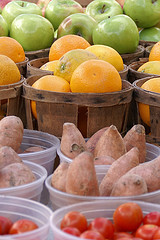Walmart Realizes Buying Local Produce Can Be Good For Business
Now that Walmart has become the world’s largest grocer, it has realized there are both economic and environmental reasons to purchase and re-sell locally grown produce. As part of its latest sustainability efforts announced earlier today, the retail behemoth detailed a plan to increase the percentage of its produce that it gets from local growers.
However, while Walmart does plan a significant uptick in local produce purchases between now and 2015, the NY Times reports that the goals for U.S. stores are nowhere near as lofty as those for Walmarts elsewhere:
In the United States, Wal-Mart plans to double the percentage of locally grown produce, to 9 percent. Wal-Mart defines local produce as that grown and sold in the same state. Still, the program is far less ambitious than in some other countries — in Canada, for instance, Wal-Mart expects to buy 30 percent of produce locally by the end of 2013, and, when local produce is available, increase that to 100 percent.
In emerging markets, Walmart has pledged to sell $1 billion of food from farmers with fewer than 50 acres. It will also provide training for farmers on choosing crops, irrigation and pesticides.
The company is also investing $1 billion to improve its supply chain for perishable foods, with the goal of decreasing food waste by 15% in emerging markets and 10% elsewhere.
Walmart also announced that sustainably sourced palm oil be used in all its private-label products and that any beef it sells not contribute to the deforestation of the Amazon.
In addition to these new initiatives, Walmart’s Sam’s Club warehouse stores also received a handful of new goals, like increasing sales of fair-trade certified produce and flowers by 15%, requiring all seafood suppliers to become certified as sustainable, and reducing food waste in clubs and distribution centers by 11% a year.
Said a professor of ecological engineering who worked on the new goals with Walmart:
The impact of not just Wal-Mart but the entire food and agricultural sector starting to define what is acceptable practice in their supply chain, and then what is unacceptable practice, will move agricultural producers en masse.
Wal-Mart to Buy More Local Produce [NY Times]
Want more consumer news? Visit our parent organization, Consumer Reports, for the latest on scams, recalls, and other consumer issues.


